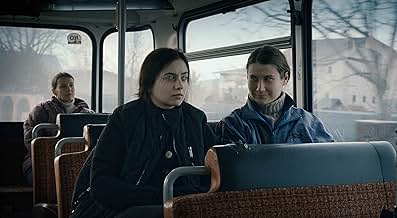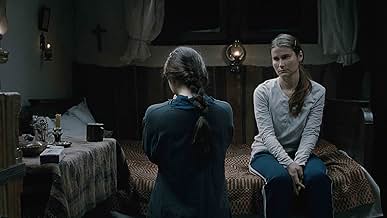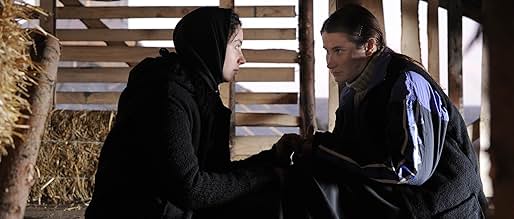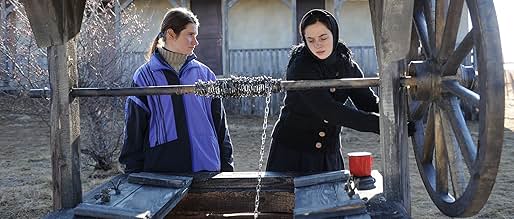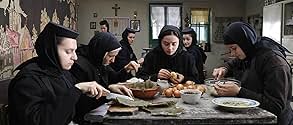AVALIAÇÃO DA IMDb
7,5/10
14 mil
SUA AVALIAÇÃO
A amizade entre duas jovens que cresceram no mesmo orfanato: uma delas encontrou refúgio em um convento na Romênia e se recusa a ir embora com sua amiga, que agora mora na Alemanha.A amizade entre duas jovens que cresceram no mesmo orfanato: uma delas encontrou refúgio em um convento na Romênia e se recusa a ir embora com sua amiga, que agora mora na Alemanha.A amizade entre duas jovens que cresceram no mesmo orfanato: uma delas encontrou refúgio em um convento na Romênia e se recusa a ir embora com sua amiga, que agora mora na Alemanha.
- Direção
- Roteiristas
- Artistas
- Prêmios
- 8 vitórias e 19 indicações no total
Valeriu Andriuta
- Priest
- (as Valeriu Andriutã)
- Direção
- Roteiristas
- Elenco e equipe completos
- Produção, bilheteria e muito mais no IMDbPro
Avaliações em destaque
Mungiu has managed in his films a perfect balance between portraying specific Romanian social-cultural issues and in the same time rendering them universal for the public abroad. He touches some of the Romanian taboos like the Orthodox church and its often brainwash practises, the efficiency of God-like doctors or the dark side of some of the do-gooders in social aid and work. The irony is that while all the characters in the film proclaim often and loud that they are sympathetic towards the orphan girl they are also the authors of her greatest abuses , from financial rip off to medical neglect or physical restraint .The system itself is rejecting the poorest and most vulnerable young people as is pointed out throughout the film by the recurrent motif of 'we have nowhere to go' leaving them in the hands of an often merciless world .In the very best of tradition of the superstitious Christian Romanian culture the real problems are avoided as they will throw a negative light back on everyone so it is easiest to blame all on evil spirits .The last scene gives a great insight into an emotionally devoid society , when such individual drama will become another media circus headline.
The Romanian film Dupa Dealuri (2012) was shown in the U.S. with the title "Beyond the Hills." The movie was written and directed by Cristian Mungiu.
A better name for this film would have been "Beyond the City," because the movie takes place in a Romanian convent where conditions are basically medieval--no electricity, no running water, no central heating. Ironically, the convent overlooks a modern city. When anyone from the convent visits the city, we are jarred into remembering that the action is happening today, rather than 500 years ago. A group of nuns live in the convent, which is directed by an Orthodox priest and his wife, who is the mother superior.
Two young women grew up together in an orphanage, and then separated. One of the friends, (Volchita, played by Cosmina Stratan) has joined the convent. The other (Alina, played by Cristina Flutur) has gotten work in Germany. When Alina returns to visit Cosmina at the convent, the movie appears destined to be about a liberated woman freeing her more traditional friend from the repressive religious, patriarchal, atmosphere of the convent. That's not the direction the film takes.
We learn that Alina is desperate to be with Cosmina. She wants Cosmina to leave the convent and join her in Germany. It's Alina who is troubled. Cosmina is happy at the convent, and truly believes that Alina belongs there as well.
I assumed that the convent would be a place of repression and degradation, but that isn't the case. The life is hard, but the nuns are not mistreated, and they don't appear to have been brainwashed into accepting the strict rules set down by the priest (played by Valeriu Andriuta).
The interactions between the outsider--Alina--with Cosmina and the nuns and priest take turns and twists that I wouldn't have predicted. It's a hard, cold life at the convent, and this is a hard, cold portrayal of that life, and what happens when that life is disturbed.
Beyond the Hills is a grim, but fascinating, movie about good intentions meeting harsh reality. The acting and cinematography are superb. It's definitely worth seeking out and viewing.
We saw this film at the excellent Dryden Theatre at George Eastman House in Rochester. It will work well on DVD. Beyond the Hills was submitted as the Romanian entry in the 2013 Academy Awards Best Foreign Language Film category.
A better name for this film would have been "Beyond the City," because the movie takes place in a Romanian convent where conditions are basically medieval--no electricity, no running water, no central heating. Ironically, the convent overlooks a modern city. When anyone from the convent visits the city, we are jarred into remembering that the action is happening today, rather than 500 years ago. A group of nuns live in the convent, which is directed by an Orthodox priest and his wife, who is the mother superior.
Two young women grew up together in an orphanage, and then separated. One of the friends, (Volchita, played by Cosmina Stratan) has joined the convent. The other (Alina, played by Cristina Flutur) has gotten work in Germany. When Alina returns to visit Cosmina at the convent, the movie appears destined to be about a liberated woman freeing her more traditional friend from the repressive religious, patriarchal, atmosphere of the convent. That's not the direction the film takes.
We learn that Alina is desperate to be with Cosmina. She wants Cosmina to leave the convent and join her in Germany. It's Alina who is troubled. Cosmina is happy at the convent, and truly believes that Alina belongs there as well.
I assumed that the convent would be a place of repression and degradation, but that isn't the case. The life is hard, but the nuns are not mistreated, and they don't appear to have been brainwashed into accepting the strict rules set down by the priest (played by Valeriu Andriuta).
The interactions between the outsider--Alina--with Cosmina and the nuns and priest take turns and twists that I wouldn't have predicted. It's a hard, cold life at the convent, and this is a hard, cold portrayal of that life, and what happens when that life is disturbed.
Beyond the Hills is a grim, but fascinating, movie about good intentions meeting harsh reality. The acting and cinematography are superb. It's definitely worth seeking out and viewing.
We saw this film at the excellent Dryden Theatre at George Eastman House in Rochester. It will work well on DVD. Beyond the Hills was submitted as the Romanian entry in the 2013 Academy Awards Best Foreign Language Film category.
A grim and intense story about love, faith, the presence of God and the absence of God, slowly penetrates the viewer's mind, so slowly that it takes Director and Screenplayer Cristian Mungiu more than two hours to make a convincing case for redemption. No doubt that he has a skilled team, to include Oleg Mutu (cinematography). This is not a horror movie; what is horrifying is the knowledge that it is based on a real story of a 2005 Christian Orthodox exorcism gone wrong, somewhere beyond the hills of Moldavia (a region in Eastern Romania). The scariest aspect is that it can happen to you, no need for a monastery or any kind of mental illness. All it takes is to express disdain against a highly controlled environment, the kind of environment that requires continuously patching the stove such that no smoke comes out to spoil the harmony of a strict yet loving family. The movie builds upon the viewer's expectancy that what can go wrong it will, and, with a remarkable lack of explicit violence, creates a gripping parallel reality where all imaginary roads are paved with good, harmful intentions. Both the priest and the doctor want to help, each in his system of reference. The police are interested in helping too, to the best of their ability. In the end, it's hard to blame or hate anybody for the strange turn of events. Even the priest (Valeriu Andriuta) draws some sympathy for his apparent lack of options. But hey, there is a bright side to this bleak work of art, not a masterpiece but still an outstanding work of art: the thin line between desire and rejection drawn by Cosmina Stratan (Voichita) and Cristina Flutur (Alina). Patched with moments of fragile silence and delicate whispers, their relationship evolves into one of the most tender and frightening love stories. Now, who harbors the Devil is still up for debate
Well,I wanted desperately, not to like, to love this movie... All the premises were there, I couldn't wait for the film to be released... But, as the film was developing in front of my eyes, I was completely feeling less...No attachment to the girls, I didn't even care for one damn second about any of them, the film scratches everything that is supposed to carve upon, the director seems in a hurry to reach something that slips between his fingers...I felt no compassion for that girl, in some moments I was about to scream to her, get out of that place, girl, return to Germany, live your life and put ourselves out of the misery of watching this movie!And one more thing. The performances of both girls, cumulated, multiplied by 100, they never, ever, never ever, are any close to the magnificent performance of Emanuelle Riva in Amour... So , Nanni Moretti, I don't really know what came to your mind when you gave that award to these two, frustrating the beautiful Riva of that super-deserved award
It is a sad story told in a fair way. You see the two characters desperately trying to save each other, but also desperately trying to keep themselves into the "safe bubble" they created around them: Voichita's bubble is the monastery, Alina's bubble is Voichita, the only human being that ever loved her.
It is the story of two girls who grew up in an orphanage (I felt a shiver trying to imagine it) and had few choices at the moment they became adults. The movie lefts many questions open. One of them, the hardest perhaps, is how was it possible that nobody (monastery, hospital, school, foster family, police, etc.) was able to help a girl, while everybody agreed on the fact that she needed help.
It is the story of two girls who grew up in an orphanage (I felt a shiver trying to imagine it) and had few choices at the moment they became adults. The movie lefts many questions open. One of them, the hardest perhaps, is how was it possible that nobody (monastery, hospital, school, foster family, police, etc.) was able to help a girl, while everybody agreed on the fact that she needed help.
Você sabia?
- CuriosidadesFilmed and edited simultaneously in chronological order.
- ConexõesFeatured in At the Movies: Cannes Film Festival 2012 (2012)
Principais escolhas
Faça login para avaliar e ver a lista de recomendações personalizadas
- How long is Beyond the Hills?Fornecido pela Alexa
Detalhes
- Data de lançamento
- Países de origem
- Centrais de atendimento oficiais
- Idioma
- Também conhecido como
- Beyond the Hills
- Locações de filme
- Campina, Romênia(location)
- Empresas de produção
- Consulte mais créditos da empresa na IMDbPro
Bilheteria
- Faturamento bruto nos EUA e Canadá
- US$ 124.919
- Fim de semana de estreia nos EUA e Canadá
- US$ 14.622
- 10 de mar. de 2013
- Faturamento bruto mundial
- US$ 673.493
- Tempo de duração2 horas 32 minutos
- Cor
- Mixagem de som
- Proporção
- 2.35 : 1
Contribua para esta página
Sugerir uma alteração ou adicionar conteúdo ausente

Principal brecha
By what name was Além das Montanhas (2012) officially released in India in English?
Responda

